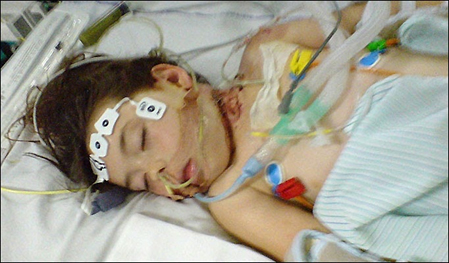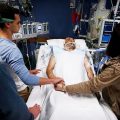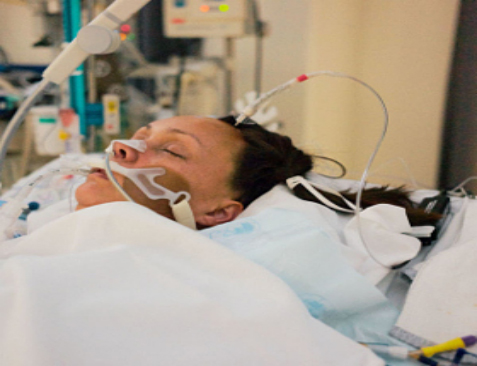Hi, it’s Patrik Hutzel from INTENSIVECAREHOTLINE.COM where we instantly improve the lives for Families of critically ill Patients in Intensive Care, so that you can make informed decisions, have PEACE OF MIND, real power, real control and so that you can influence decision making fast, even if you’re not a doctor or a nurse in Intensive Care!
This is another episode of “YOUR QUESTIONS ANSWERED” and in last week’s episode I answered another question from our readers and the question was
You can check out last week’s question by clicking on the link here.
In this week’s episode of “YOUR QUESTIONS ANSWERED” I want to answer questions from one of my clients Ron, as part of my 1:1 consulting and advocacy service! Ron’s son is critically ill in ICU and has a breathing tube in place. Ron is asking what makes it difficult for the ICU team to wean his son off the ventilator?
My Son is in ICU and Ventilated. Why Does the ICU Team Cannot Wean my Son Off the Ventilator?

“You can also check out previous 1:1 consulting and advocacy sessions with me and Ron here.”
Dr. Whiteside: He’s also on continuous renal replacement therapy.
Patrik: Yes, yes. I’m aware of that. I’m aware of that.
Dr. Whiteside: Yeah.
Patrik: Yeah, yeah. So, his main issue is really is, he’s not waking up obviously, because of brain damage. And he does have some sort of lung infection where his oxygen requirements are pretty high, and he’s also not conforming with any ventilation you were sort of trying to apply to him?
Dr. Whiteside: Right. And the ongoing renal placement.
RECOMMENDED:
Patrik: Yes, yes. Renal replacement and probably some beta suppressors, I would imagine. Probably some epinephrine or norepinephrine or-
Dr. Whiteside: Yeah. He’s on some epinephrine, and the other thing is … What are the issues? One of the things that I’m attributing, I think, with bilateral lung issues, it’s daily blood products.
Patrik: Right.
Dr. Whiteside: We got one unit to play with yesterday. Got three units to play with the day before, because he was hemorrhagic to start.
Patrik: Yeah, yeah.
Dr. Whiteside: They have us, I think, one unit of blood yesterday.
Patrik: Right, right.
Dr. Whiteside: After that. Right, one of blood yesterday.
Patrik: Right, right, right. Okay. Okay. Look, I do really appreciate your time and your-
Dr. Whiteside: Yeah, of course. If there’s anything I can help.
Patrik: Yeah, no, down the line maybe. But I just needed to get a better understanding of what was happening. I really appreciate your time with it. I’m sure you’re doing everything you can. Thank you so much for your help.
RECOMMENDED:
Dr. Whiteside: If there’s anything, let me know.
Patrik: Thank you, thank you.
Ron: Thank you. Hello?
Patrik: Hi. Did you manage to listen to some of that?
Ron: Yeah, I heard some of it. Yeah.
Patrik: Right, right. Okay. So, whilst they haven’t sort of nailed down pneumonia or a chest infection as such, they’re not quite clear what’s happening with the lungs, but there is something happening with the lungs. They do suspect there is a pneumonia, potentially even ARDS. Have you heard of ARDS before?
Ron: I’ve read briefly.
Patrik: Right, right. So they can’t rule out that ARDS might be happening. ARDS basically means lung failure. Right?
Ron: Alright.
Patrik: The chest x-ray, ironically, you can see some what’s called consolidation, but it’s not … The next chest x-ray you sent, is that from a later one from that day?
Ron: This morning. That was from this morning, about 6 AM.
Patrik: Okay. Just give me one sec please. Yeah, I’m just comparing the two. Just give me one sec please. I’m just comparing the two. Okay. Okay. So yeah, that’s definitely … Yeah, I think … The first one you sent was from the day before?
Ron: The first one was from today. It was around maybe 2 PM.
Patrik: Okay, okay.
Ron: 1 or 2 PM.
Patrik: Right, and the second one was-
Ron: From this morning around 6:00 AM.
Patrik: Right. Okay, okay. I should have asked him that, and I didn’t ask him that. But the oxygen; do you remember where the oxygen was at yesterday?
Ron: Yeah, it was at 65.
RECOMMENDED:
Patrik: Right.
Ron: Wait, hold on. 55.
Patrik: Okay, okay. Yeah. Sure, sure. Okay, so it has gone up significantly. Yeah, yeah.
Ron: I mean, they’ve been planning around with it.
Patrik: Yes, he said that. Yes, he said that, that they have been playing around with it. But he also said that obviously in the last 24 hours, there has been a deterioration with lung function. They’re not 100% clear of what it is, whether it is a pneumonia or whether it is potentially ARDS. All the tests from the sputum have come back negative. Right? The x-ray to me doesn’t look like ARDS. ARDS x-rays, usually quite significant. I think there are some signs that it could be trending in that direction, but it’s not sort of full blown as yet. But 90% oxygen is … It’s a huge thing. If you think about, you can’t go any higher than 100%.
Ron: Right.
Patrik: Right? So 90% is significant. Right? So, was that part of their discussion this morning with you? The lung function in particular. Was that-
Ron: No, no.
Patrik: Right, right, right. Because I do believe that needs to be brought up as a point of discussion, rather sooner than later. I did ask him whether there has been any brain damage or not. I’m not sure whether you heard me asking.
RECOMMENDED:
Ron: Yeah.
Patrik: Right. He was sort of very negative about that. You might’ve heard what he said in terms of the MRI.
Ron: Yup.
Patrik: So look, I am not disputing the MRI results. What I am, however, saying is that the goal for a patient in intensive care is usually to survive intensive care. Right?
Ron: Right.
Patrik: And then if there is brain damage, right, yes, that may be the case, but that would then be an issue of rehabilitation. It’s not an intensive care thing as such, and that’s why I believe it’s so important to keep a neurologist very close to this. Right? The neurologists are the people who sort of will look at any treatment options with brain recovery down the line.
Ron: Right.
Patrik: Right. This doctor that I spoke to, he’s a junior doctor or is he sort of a senior consultant? What’s his sort of-
Ron: Hold on. Yeah. Patrik?
Patrik: Yes?
Ron: Yeah, he’s been here about 12 years.
Patrik: Twelve?
Ron: Yeah, at this facility. I don’t know where anywhere else, but yeah.
Patrik: No, no. That’s all right. That’s all right. That’s good. No, no. Then he is senior, because I was just trying to find out what his sort of level of experience is.
Ron: Right.
Patrik: And if he’s been there for 12 years, then clearly he must be a senior person in there.
Ron: Right.
Patrik: That’s okay. He just sounded very young to me, and that’s because when you talk to people on the phone, it’s sometimes hard to make sense of where do they sit in the hierarchy or … So, okay.
Patrik: All right. So with that, I do believe. I am then surprised that they haven’t sort of … With 90% of oxygen requirements, there’s no way your son will be extubated anytime soon. And when I say anytime soon, I’m talking about the next few days.
Ron: Right.
Patrik: Right. So which then brings up the next question; would they potentially look at a tracheostomy? I do feel those are all the issues that need to be brought up. So that gives me a good picture of what’s happening. The other thing that he mentioned is obviously daily blood transfusions.
RECOMMENDED:
Ron: Yeah. So, it’s because of the bleeding.
Patrik: Yeah, yeah. And that that has been something that’s happened even before the cardiac arrest?
Ron: Before the cardiac arrest. Yeah, so needed periodically. Yeah.
Patrik: Right, right. Daily, or-
Ron: Not daily. Like every few days, maybe.
Patrik: Right.
Ron: It depends on if he’s actively bleeding at that time or not.
Patrik: Sure, sure. And prior to this, to the cardiac arrest, how long was he in hospital?
Ron: We’ve been here since March. He had his transplant in May.
Patrik: Oh my goodness. So you haven’t been home since March?
Ron: No, we have not.
RECOMMENDED:
Patrik: My goodness. Okay, okay. But at least you didn’t have to change hospitals. You’ve always been in the same hospital?
Ron: Yeah, we’ve always been here.
Patrik: Right. And is this the first time that he’s in intensive care?
Ron: For this reason? Yeah.
Patrik: Has he been in intensive care for any other reasons?
Ron: Yeah. He was down here before because he had … As a side effect of the medicines. So they had to put him on dialysis for that a few months back, and that was probably back in, I want to say maybe July.
Patrik: Okay. But he wasn’t ventilated then?
Ron: No, he wasn’t ventilated. This is his first time ever being ventilated.
Patrik: Yeah. Sure, sure. Okay. Right. So I think besides obviously the potential damage that’s been caused neurologically, the biggest concern now is the lung function.
Ron: Right.
Patrik: Right? I would imagine that … Are they going to do another round tonight?
Ron: Yeah, they will.
Patrik: What time?
Ron: A different attendant is coming on.
Patrik: Right.
Ron: I would see him maybe around 7 PM, if that.
Patrik: Right. Okay, okay. Are you always there for the round?
Ron: I’m always here, yeah.
Patrik: Right, right.
Ron: I stay here.
Patrik: Right. And you stay overnight as well?
Ron: Yes.
Patrik: Right. Do you get any sleep?
Ron: You know-
Patrik: Right.
Ron: It’s hard to do that, so-
RECOMMENDED:
Patrik: Yeah. The reason I’m asking is I do believe, well and I know from experience, you are just as important as your son because you will need … Well, and you know that, you need some strength, you need some stamina.
Ron: Right.
Patrik: Having been a shift worker for many years, having worked night shift and whatnot, I know how tiring it is.
Ron: Right.
Patrik: But look, I do feel like the next step is … I will provide a list of questions for the round later tonight because I think especially … It concerns me that they haven’t really explained that ARDS is potentially happening or pneumonia is potentially happening. That they haven’t explained to you that 90% of oxygen is … That’s massive concern.
Ron: Right, They go down on it.
Patrik: That’s right. That’s right. It sounds to me like nobody’s explained to you what or why or … They’ve been discussing it amongst themselves, but they’ve never explained to you what-
RECOMMENDED:
Ron: Right.
Patrik: Let’s just say he goes up to 100%. There would be consequences to that.
Ron: Right.
Patrik: You know? So, just give me one sec please. Just give me-
Ron: Yeah.
Patrik: What time is it for you at the moment?
Ron: 5:30 PM.
Patrik: 5:30 PM, okay. So what I would suggest as a next step, I would write up some questions for the round and have a look at them. I would be very happy to get on the phone again during the round, or you can ask them during the round and either get me on the phone or we can talk after, or whichever way you want to handle it is fine with me. But now that we’ve gotten more information, Especially with a lung function, that is a massive concern, and I do believe we need more information and we need to understand how they want to manage it going forward.
Ron: Right.
Patrik: Because number one, it makes coming off the ventilator unlikely, and-
Ron: At one point, they were talking about steroids for his-
Patrik: Sure.
Ron: Steroid for the lungs.
Patrik: Yeah. If he has ARDS, he will need steroids. There’s no doubt about that. If he has ARDS, that he will need steroids. It sounds to me like he hasn’t been fully diagnosed with that yet.
Ron: No, that hasn’t … They never said that was … That they had anything like that.
Patrik: That’s right. He mentioned it to me because I asked him, I said to him, “Is it ARDS, or …” and he said, “Look, the chances are there, but they’re not certain yet.” So, that’s what I would suggest. If you give me about an hour or so, then I will write up some questions for the round.
RECOMMENDED:
Ron: Okay.
Patrik: And then I do believe we will need to get some answers to those questions. Before I do that, do you have any other questions?
Ron: I’m just wondering, should I have them go down on the oxygen?
Patrik: Yeah, that’s a good question. That will be part of my questions. They can only do that if the arterial blood gases are satisfactory. Have you heard of arterial blood gases?
Ron: Yeah, the blood gases. They draw them like every six hours, I think.
Patrik: That’s right, that’s right. One of the reasons they would have gone up with the oxygen is because his blood gases weren’t satisfactory. Okay?
Ron: Why? I mean … I can see the lab.
Patrik: Say that again please?
Ron: I’ll shoot you over a picture of a lab-
Patrik: That would be good. That would be good. That would be good. One of their deciding parameters would have been a blood gas that’s not satisfactory, and that’s when they would have gone up with the oxygen.
Ron: Right. Right.
Patrik: So-
Ron: And the second thing is they’re going to give him a dose of that-
Patrik: Say those again please.
Ron: They want to give him a dose of that Vecuronium.
Patrik: Yes, that’s right. He said that. Which is another sign he wasn’t complying with the ventilation modes. So that’s why they had to paralyse him.
Ron: They didn’t give it yet. They’re just waiting for me. They want to give it now.
RECOMMENDED:
Patrik: Oh, they want to give it now?
Ron: Right.
Patrik: Right, right. Well, with a breathing rate of 45, that’s too high. Breathing rate of 45 is too high. His pH is down, right? Which is what the doctor said.
Ron: Yeah.
Patrik: Right, and that’s a concern. So they have to do something. Right?
Ron: Okay.
Patrik: And that makes sense to me.
Ron: Okay.
Patrik: But what I’ll do next, really I’ll … If you’re okay with that, I’ll write up a list of questions that I will have with you in the next hour.
Ron: Okay.
Patrik: And then maybe we’ll jump on the phone again then.
Ron: Okay. Sounds good.
Patrik: All right. I’ll be back in the next hour or so.
Ron: Okay. All right.
RECOMMENDED:
Patrik: Okay? If there’s something urgent, of course, give me a call. But I’ll call you back-
Ron: Absolutely.
Patrik: … in about, just before 7:00.
Ron: Okay. Thank you, Patrik.
Patrik: Okay. Thank you, Ron. Thank you. Bye.
Ron: Bye.
The 1:1 consulting session will continue in next week’s episode.
How can you become the best advocate for your critically ill loved one, make informed decisions, get peace of mind, control, power and influence quickly, whilst your loved one is critically ill in Intensive Care?
You get to that all important feeling of making informed decisions, get PEACE OF MIND, CONTROL, POWER AND INFLUENCE when you download your FREE “INSTANT IMPACT” report NOW by entering your email below!
In Your FREE “INSTANT IMPACT” report you’ll learn quickly how to make informed decisions, get PEACE OF MIND, real power and real control and how you can influence decision making fast, whilst your loved one is critically ill in Intensive Care! Your FREE “INSTANT IMPACT” Report gives you in-depth insight that you must know whilst your loved one is critically ill or is even dying in Intensive Care!
Sign up and download your FREE “INSTANT IMPACT” REPORT now by entering your email below! In your FREE “INSTANT IMPACT” REPORT you’ll learn how to speak the “secret” Intensive Care language so that the doctors and the nurses know straight away that you are an insider and that you know and understand what’s really happening in Intensive Care! In your FREE report you’ll also discover
- How to ask the doctors and the nurses the right questions
- Discover the many competing interests in Intensive Care and how your critically ill loved one’s treatment may depend on those competing interests
- How to eliminate fear, frustration, stress, struggle and vulnerability even if your loved one is dying
- 5 mind blowing tips & strategies helping you to get on the right path to making informed decisions, get PEACE OF MIND, control, power and influence in your situation
- You’ll get real world examples that you can easily adapt to you and your critically ill loved one’s situation
- How to stop being intimidated by the Intensive Care team and how you will be seen as equals
- You’ll get crucial ‘behind the scenes’ insight so that you know and understand what is really happening in Intensive Care
- How you need to manage doctors and nurses in Intensive Care (it’s not what you think)
Thank you for tuning into this week’s YOUR QUESTIONS ANSWERED episode and I’ll see you again in another update next week!
Make sure you also check out our “blog” section for more tips and strategies or send me an email to [email protected] with your questions!
Also, have a look at our membership site INTENSIVECARESUPPORT.ORG for families of critically ill Patients in Intensive Care here.
Or you can call us! Find phone numbers on our contact tab.
Also check out our Ebook section where you get more Ebooks, Videos and Audio recordings and where you can also get 1:1 counselling/consulting with me via Skype, over the phone or via email by clicking on the products tab!
This is Patrik Hutzel from INTENSIVECAREHOTLINE.COM and I’ll see you again next week with another update!







